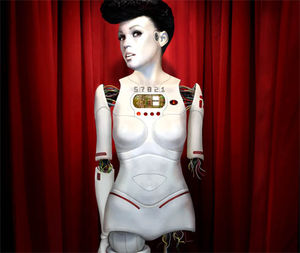The following is also my column this week at Blackpower.com.
The Grammy nominations for the 2009 urban/alternative category were announced recently and, while I'm happy that both Janelle Monae (who should win) and Kenna were nominated, overall the category is a disappointment. I see a missed opportunity to highlight Black artists who are truly pushing boundaries.
How should we read “urban/alternative”? For example, does it mean “or”, as in “urban or alternative”? Or do we read it as a qualifier for urban, as in “urban alternative” or “alternative urban”? My preference is for this latter reading, which is probably what is getting me into trouble. Wikipedia defines the urban/alternative Grammy category as follows: “Works nominated are considered to be of an alternative urban genre. Alternative hip hop, electro, funk, jazz, soul and reggae are examples of alternative urban genres.” Interesting that there's no reference to rock.
The category itself is relatively young, making its debut in 2003 when India.Arie won it. Following her over the years were OutKast, Jill Scott, Damian Marley, Gnarls Barkley and, as of last year, Lupe Fiasco featuring Jill Scott. And, to be honest, I was pleased to see that artists who in some ways made a break with the tried and true were being nominated: Cee-Lo (predicting his Gnarls Barkley success), Alice Smith (an undeniable talent), Mos Def (for his rock work), and Me'Shell Ndegeocello (a Black Rock Coalition mainstay), to name few. The category was also full of complete misses, such as nods for middling remakes by Dwele and Sergio Mendes/the Black Eye Peas.
So what does it mean to be “alternative”? I believe it means that you've got to be a clearly different choice from the other available options. In fact, the definition that I prefer to use is as follows: “employing or following nontraditional or unconventional ideas, methods, etc.; existing outside the establishment”.
Kenna and Janelle Monae fit this description. Kenna is an Ethiopian-born American singer whose album “Make Sure They See My Face” draws on the musical palette of the 80s and early 90s to create his manic, emotive sound. I hear a lot of The Cure and shades of Phil Collins in his album. Janelle Monae's album “Metropolis: The Chase Suite” is that rare concept album. It's set in a dystopian future where humans and robots are forbidden to fall in love. Of course, the main protagonist, robot Cindy Mayweather, does and thus begins the cinematic journey of this album. I say cinematic because it's clear that the film inspirations here were Fritz Lang's “Metropolis” and/or Ridley Scott's “Blade Runner”. Both Kenna and Janelle are coming at their music from nontraditional angles.
The other three nominated artists beg the question: Alternative compared to what? It's not about their talent, which is not in question. I feel as though Maiysha is in this category because she's pulled from a slightly larger sonic palette. And certainly her efforts were not wasted, since she's created a very good R&B/soul album that's powered by her impressive vocal and writing talents. Wayna's got this whole jazz approach, which is great to hear but, again, does not make her R&B groundbreaking. Chrisette Michele is a self-described R&B singer, one with strong jazz, gospel and blues influences, but an R&B singer nonetheless.
So, when I look at the “urban/alternative” category, I'm first looking for artists who are defying convention by doing more than just being a little different. And it would've been easy to fill this category with Black artists who really challenged conventions in 2008. Santogold. Saul Williams. Most importantly, where is TV On The Radio, whose album “Dear Science” was just named Album of the Year by both Rolling Stone and SPIN magazines?
Ultimately, it's problematic to put traditional artists into this category, no matter how good they are.
First, “urban/alternative” becomes a throwaway category for R&B or hip hop artists who got boxed out of the main categories. Can't compete with Beyoncé, Jennifer Hudson or Alicia Keys? Didn't make the best new artist cut? Here, sit at the junior table so you can still get something.
Second—and this is probably most important—it does nothing to expand the public's view of the possibilities of Black expression. Of course, it'd be naïve to think this is the role of the Grammys, which is all about reinforcing convention. But, at a time when we need to feed our imaginations with new ideas, new examples of people striking out on different paths, we can't reward people with what's supposed to be music's highest honor for just covering the basics, i.e., good singing and using live instrumentation (which has seemingly become the shorthand in Black music for “I'm a real artist”).
Believe me, I understand what a Grammy-nomination means for an artist's career: Sales bumps, continued or renewed support by a label, consideration for opportunities they might not otherwise have, and general reaffirmation that they're on the right path. I congratulate all of the nominees for the work and commitment that brought them to this point in their careers.
But let’s not act like we don't know what “alternative” really is. Alternative artists boldly challenge our assumptions about the limits of Black music by combining craft, radical departures from traditional sounds, and a fearless commitment to share their personal visions. By supporting more artists like this, we're not just banging on the walls of the narrow box that surrounds Black music, we're knocking that sonovabitch down.

